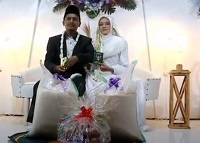Comparison of Customary Law and Islamic Law on the Tradition of Donation in Walimatul 'Urs: in Padukuhan Nepi, Kranggan Village, Galur Sub-district, Kulon Progo Regency
DOI:
https://doi.org/10.59698/quru.v2i2.193Keywords:
Donation, , Walimatul Ursy, , Comparison, , Customary Law, , Islamic Law.Abstract
Marriage is a noble sunnah that has been carried out by the Prophets and Messengers and the early and late generations who followed their guidance. Walimah itself means a celebration, a banquet specifically for marriage and is not used for events outside of marriage. Walimah according to the custom in Padukuhan Nepi is very important so that to hold a walimah the community has its own way to create the event such as collecting donations with the tonjokan tradition, namely giving in the form of food or groceries given before the walimah takes place. The subject matter discussed in this thesis is how the practice of how customary law and Islamic law views the practice of giving donations walimatul 'urs? and how does the community respond to the practice of giving donations at walimatul 'urs itself? This research is a field research. Data collection techniques include observation and literature study conducted by documenting documents and literature related to the research material. This research is descriptive comparative with normative and sociological approaches. Then the analysis method used is comparative analysis to compare the two concepts and find the meeting point of the two concepts. The results of this study indicate that in understanding the practice of donations in walimatul 'urs, Islamic law provides more benefits and convenience compared to customary law. In Islamic law, giving a donation is not an obligation but a voluntary gift that is believed to be rewarded by Allah SWT, while in customary law, especially the custom in Nepi Padukuhan, giving a donation at walimatul 'urs is an obligation because if it is not implemented, it will get its own sanctions from the local community.
References
Abdoeh, Nor Mohammad. “Hibah Harta Pada Anak Angkat: Telaah Sosiologis Terhadap Bagian Maksimal Sepertiga.” Cakrawala: Jurnal Studi Islam 13, no. 1 (2018): 1–18.
———. “Hibah Semua Harta Kepada Anak Angkat (Telaah Komparasi Antara Kuh Perdata Dan Khi).” Ahkam: Jurnal Hukum Islam 8, no. 1 (2020).
Adibah, Ida Zahara. “Pendekatan Sosiologis Dalam Studi Islam.” INSPIRASI (Jurnal Kajian Dan Penelitian Pendidikan Islam) 1, no. 1 (2017): 1–20.
Arikunto, Suharsimi, Prosedur Penelitian: Suatu Pendekatan Praktik, Jakarta: PT.Bina Aksara, 1983.
Ash-Shiddieqy, Mutiara Hadits 4, Semarang: PT. Pustaka Rizki Putra, 2003.
Basyir, Ahmad Azhar, Asas-Asas Hukum Muamalat: Hukum Perdata Islam, Yogyakarta: UII Press, 2000.
Bawani, Imam, Tradisionalisme Dalam Pendidikan Islam, Surabaya: Al Ikhlas, 1990.
Departemen Agama RI, Al-Qur’an dan Terjemahnya, Jakarta: CV. Darus Sunnah, 2002.
Hadi, Sutrisno, Metodologi Research, Yogyakarta: Yayasan Penerbitan FIP.IKIP,1968.
Hadi, Sutrisno, Metodologi Riset, Yogyakarta: Nadi Offset, 1994.
Haroen, Nasrun, Ushul Fiqh 1, Jakarta: Logos Wacana Ilmu, 2001.
Herdiansyah, Haris, Metodologi Penelitian Kualitatif, Jakarta: Salemba Humanika, 2010.
Kamal, Fiqh Sunnah Wanita, Jakarta: Tiga Pilar, 2007
Khallaf, Abdul Wahhab, ‘Ilm Ushûl al-Fiqh, Beirut: Dar al-Fikr, 1978.
Ma’arif, Samsul, Kaidah-Kaidah Fiqih, Bandung: Pustaka Ramadhan, 2005.
Marzuki, Metodologi Riset, Yogyakarta: BPFE UII, 2002
Maskur, Syafi’i, Kekuatan Sedekah, Yogyakarta: Briliant Books, 2011.
Muhyidin, Muhammad, Keajaiban Shodaqoh, Yogyakarta: DIVA Press 2008.
Nadwi, M. Fadil, Kamus ad Diya’, Surabaya: Mekar, 1992.
Nasution, Khoiruddin, Hukum Perkawinan I, Yogyakarta: ACAdeMIA TAZZAFA, 2005.
Raco, J. R, Metode Penelitian Kualitatif Jenis, Karakteristik dan Keunggulannya, Jakarta: PT Gramedia Widiasarana Indonesia, 2010.
Rajasa, Sutan, Kamus Ilmiah Populer, Surabaya: Karya Utama, 2002
Riyadi, Ahmad Ali, Dekontruksi Tradisi, Yogyakarta: Ar-Ruzz, 2007.
Rofiq, Ahmad, Hukum Islam di Indonesia, Jakarta: PT Raja Grafindo Persada, 1998.
Sābiq, as-Sayyid, Fiqh as-Sunnah, alih bahasa oleh Mudzakir A.S., Bandung: Al-Ma’arif 1997
Shaifudin, Arif. “Memaknai Islam Dengan Pendekatan Normatif.” El-Wasathiya: Jurnal Studi Agama 5, no. 1 (2017): 1–14.
Shodiq, Kamus Istilah Agama, Jakarta: C.V. Seinttarama, 1988.
Soekanto, Soejono, Hukum Adat Indonesia, Jakarta: Raja Grafindo Persada, 2011
Sudarsono, Pokok-Pokok Hukum Islam, Jakarta: PT. Rineka Cipta, 1992
Suhendi, Hendi, Fiqh Muamalah, Jakarta: PT. Raja Grafindo Persada, 2005.
Supeno, Rahmat, Minhajul Muslim Muamalah, Bandung: PT. Remaja Rosda Karya, 1991.
Surakhmad, Winarno, Pengantar Penelitian Ilmiah Dasar, Metode dan Teknik, Bandung: Tarsito,1990.
Syarifuddin, Amir, Hukum Perkawinan Islam di Indonesia antara Fiqih Munakahat dan Undang-Undang Perkawinan, Jakarta: Kencana, 2006
Syarifuddin, Amir, Ushul Fiqh 2, Jakarta: Kencana, 2008.
Syathibi, Abi Ishaq Ibrahim ibn Musa ibn Muhammad al-Lakhmi asy-, Al-Muwāfaqāt fi Usūl asy-Syari’ah, Mesir: Maktabah at-Tijāriyah al-Kubro, 1973 M/1332 H),
Syihab, Umar, Hukum Islam dan Transformasi Pemikiran, Semarang: Bina Utama,1996.
Interview with Mbah Ali, a community leader in Nepi hamlet on May 28, 2023
Interview with Mrs. Jumirah, Pewalimah in Padukuhan Nepi, on May 28, 2023
Interview with Mrs. Suprihatin, a resident of Nepi hamlet on May 28, 2023
Interview with Mrs. Tri, a resident of Nepi hamlet, on May 29, 2023.
Interview with Mr. Dalijo, Mbah Kaum in Nepi hamlet, on May 28, 2023
Interview with Mbah Ali Sumarto, Takmir Masjid in Nepi hamlet, May 28, 2023

Downloads
Published
How to Cite
Issue
Section
License
Copyright (c) 2024 Rizka Mubarokati

This work is licensed under a Creative Commons Attribution-NonCommercial-ShareAlike 4.0 International License.
Quru': Journal of Family Law and Culture





.png)







